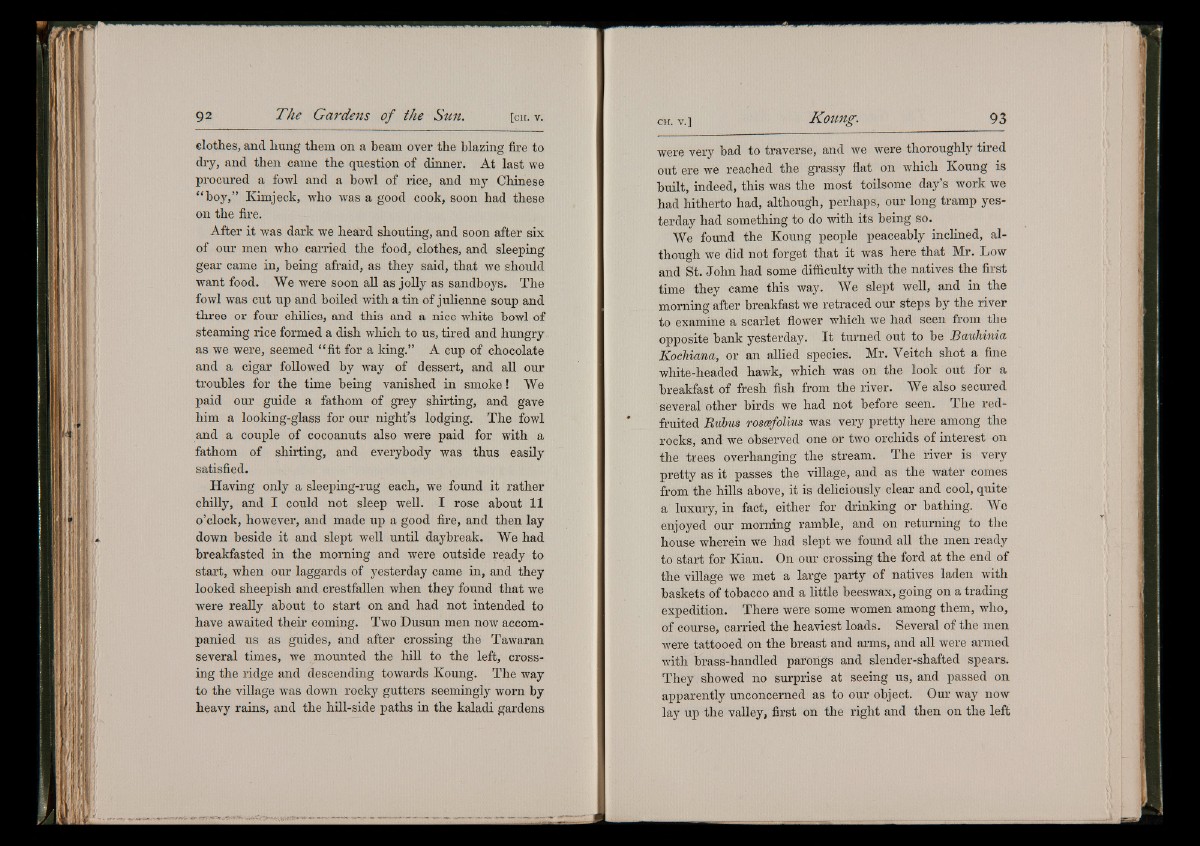
clothes, and hung them on a beam over the blazing fire to
dry, and then came the question of dinner. At last we
procured a fowl and a howl of rice, and my Chinese
“ boy,” Kimjeck, who was a good cook, soon had these
on the fire.
After it was dark we heard shouting, and soon after six
of our men who carried the food, clothes, and sleeping
gear came in, being afraid, as they said, that we should
want food. We were soon all as jolly as sandboys. The
fowl was cut up and boiled with a tin of julienne soup and
three or four chilies, and this and a nice white howl of
steaming rice formed a dish which to us, tired and hungry
as we were, seemed “ fit for a king.” A cup of chocolate
and a cigar followed by way of dessert, and all our
troubles for the time being vanished in smoke! We
paid our guide a fathom of grey shirting, and gave
him a looking-glass for our night’s lodging. The fowl
and a couple of cocoanuts also were paid for with a
fathom of shirting, and everybody was thus easily
satisfied.
Having only a sleeping-rug each, we found it rather
chilly, and I could not sleep well. I rose about 1 1
o’clock, however, and made up a good fire, and then lay
down beside it and slept well until daybreak. We had
breakfasted in the morning and were outside ready to
start, when our laggards of yesterday came in, and they
looked sheepish and crestfallen when they found that we
were really about to start on and had not intended to
have awaited their coming. Two Dusun men now accompanied
us as guides, and after crossing the Tawaran
several times, we mounted the hill to the left, crossing
the ridge and descending towards Koung. The way
to the village was down rocky gutters seemingly worn by
heavy rains, and the hill-side paths in the kaladi gardens
were very bad to traverse, and we were thoroughly tired
out ere we reached the grassy flat on which Koung is
built, indeed, this was the most toilsome day’s work we
had hitherto had, although, perhaps, our long tramp yesterday
had something to do with its being so.
We found the Koung people peaceably inclined, although
we did not forget that it was here that Mr. Low
and St. John had some difficulty with the natives the first
time they came this way. We slept well, and in the
morning after breakfast we retraced our steps by the river
to examine a scarlet flower which we had seen from the
opposite hank yesterday. It turned out to be Sctuhinia
Kochiana, or an allied species. Mr. Veitch shot a fine
white-headed hawk, which was on the look out for a
breakfast of fresh fish from the river. We also secured
several other birds we had not before seen. The red-
fruited Rubus roscefolius was very pretty here among the
rocks, and we observed one or two orchids of interest on
the trees overhanging the stream. The river is very
pretty as it passes the village, and as the water comes
from the hills above, it is deliciously clear and cool, quite
a luxury, in fact, either for drinking or bathing. We
enjoyed our morning ramble, and on returning to the
house wherein we had slept we found all the men ready
to start for Kiau. On our crossing the ford at the end of
the village we met a large party of natives laden with
baskets of tobacco and a little beeswax, going on a trading
expedition. There were some women among them, who,
of course, carried the heaviest loads. Several of the men
were tattooed on the breast and arms, and all were armed
with brass-handled parongs and slender-shafted spears.
They showed no surprise at seeing us, and passed on
apparently unconcerned as to our object. Our way now
lay up the valley, first on the right and then on the left